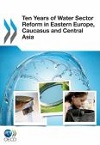Environment in emerging and transition economies
Work country programmes and National Policy Dialogues on water in Eastern Europe, Caucasus and Central Asia
Work country programmes
Since the 1990s the OECD has supported economy transition in Eastern Europe, the Caucasus and Central Asia (EECCA) countries to improve their environmental and water policies, integrate environmental considerations into the processes of economic, social and political reform and to orient towards sustainable development. All programmes and key areas of work can be found here below (in Belarus, the work programme and consequently NPD Steering Committee is in process of being established):
 |
 |
||
 |
 |
||
 |
 |
||
 |
 |
||
 |
 |
National Policy Dialogues as a process
NPDs are policy platforms where stakeholders meet to advance water policy reforms. They are usually chaired by heads of respective government agencies. A variety of stakeholders participate in the meetings, such as ministries and government agencies and institutions, as well as non-governmental organisations, the business community, and parliamentary bodies. Participants also include international organisations and EU Member States active in water policy reforms in each country.
- Discussions at NPD meetings are substantiated by robust analytical work and international best practice.
The main outcomes are policy packages, such as legislative acts, national strategies, ministerial orders and plans for implementation. Emphasis is also set on the implementation of previously adopted policies through pilot projects or technical assistance.
- EECCA countries benefit from the on-going NPDs in many ways.
Improved coordination with donors on water issues helps to increase cost-effectiveness of Official Development Assistance provided by EU Member States as well as other donors. Furthermore, NPDs provide opportunities to transfer best practices and knowledge and a number of international organisations including the OECD and UNECE to beneficiary countries.
Related Documents
Related Documents
